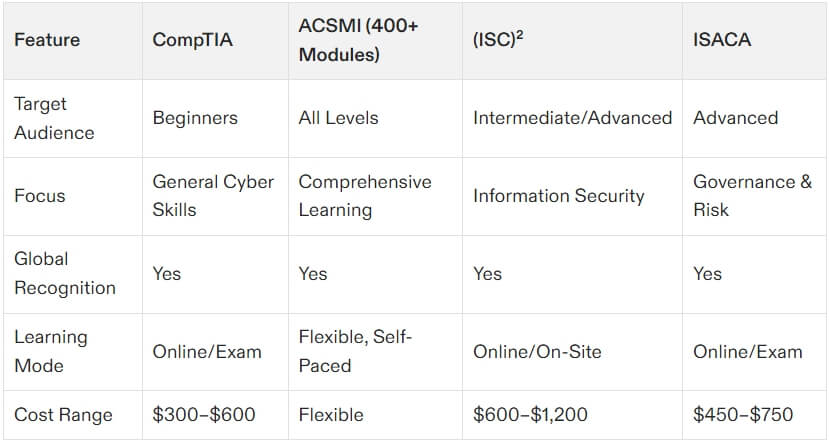Table of Contents
- What Are Cybersecurity Certification Bodies?
- The Importance of Cybersecurity Certification Bodies
- Top Cybersecurity Certification Bodies You Should Know
- Benefits of Cybersecurity Certifications from Trusted Bodies
- How to Choose the Right Cybersecurity Certification Body
- FAQs
- Informative Comparison
- Final Thoughts
The cybersecurity landscape is growing at an unprecedented pace, creating a massive demand for cybersecurity certification bodies certified professionals who can safeguard digital systems, data, and networks. With this surge in demand, cybersecurity certification bodies play a crucial role in equipping candidates with the skills and credibility needed for a successful career.
But what do these certification bodies do? Why are they so important, and how do you choose the right one for your career goals?
What Are Cybersecurity Certification Bodies?
Cybersecurity certification bodies are organizations that design, implement, and manage certifications for IT and security professionals. These bodies ensure that certifications align with current industry standards and emerging threats, equipping certificate-holders with up-to-date skills to tackle cybersecurity challenges.
These organizations build frameworks that validate skill sets ranging from entry-level fundamentals to advanced, specialized areas such as ethical hacking, cloud security, and risk management. They also set the standards for certification exams, ensuring consistent and globally recognized benchmarks for cyber professionals.
From the generalist pathways offered by CompTIA to the niche-focused certifications by ACSMI, there are options tailored to every career stage and aspiration.
The Importance of Cybersecurity Certification Bodies
Choosing the right certification body is not just about adding a credential to your resume. It impacts your career trajectory and ability to solve real-world cyber challenges. Here’s why cybersecurity certification bodies matter.
1. Setting Global Standards
Certification bodies establish a universal standard of skills and knowledge. For example, organizations like (ISC)² require candidates to demonstrate expertise before earning their CISSP credential, a globally respected benchmark.
2. Enhancing Credibility
Certifications from reputable bodies like ISACA or Google signal to employers that candidates are well-prepared, reliable, and trained in compliance with best practices.
3. Supporting Career Progression
Certifications build pathways for professional growth. Beginner-level certifications from ACSMI or CompTIA act as stepping stones to advanced specializations like penetration testing or enterprise security architecture.
4. Bridging Skill Gaps
Amid a talent shortage in cybersecurity, certification bodies ensure that professionals can gain the necessary knowledge to address the industry’s evolving threat landscape.
Discover ACSMI’s extensive certifications and training modules here.
Top Cybersecurity Certification Bodies You Should Know
When looking to enter or advance in the cybersecurity field, it’s critical to choose the right certification provider. Here’s a closer look at the top cybersecurity certification bodies and what they offer.
1. CompTIA
The Computing Technology Industry Association (CompTIA) is one of the most well-known certification bodies globally. CompTIA certifications like Security+ and Network+ are ideal for newcomers and IT professionals transitioning into cybersecurity.
2. (ISC)²
The International Information System Security Certification Consortium is renowned for its rigorous certification standards. Their certifications, such as CISSP, are highly sought after for roles in information security management.
3. ISACA
ISACA specializes in certifications focused on governance, auditing, and risk management. Credentials like CISM (Certified Information Security Manager) are perfect for professionals moving into leadership roles.
4. Offensive Security
Best known for its certification for ethical hackers, Offensive Security provides certifications like OSCP (Offensive Security Certified Professional), which are highly respected among penetration testers.
5. ACSMI
For those looking for a blend of foundational knowledge and advanced expertise, ACSMI offers certifications mapped to a comprehensive learning framework with 400+ modules. This makes it ideal for both entry-level professionals and seasoned specialists.
Explore the wide range of certifications ACSMI provides.
6. GIAC
The Global Information Assurance Certification (GIAC) is another respected body that offers certifications in high-demand areas such as penetration testing, threat hunting, and incident handling.
Benefits of Cybersecurity Certifications from Trusted Bodies
Certifications accredited by established cybersecurity certification bodies offer enormous benefits for both individuals and organizations. Here’s how they can advance a career or strengthen a company’s security posture.
For Individuals
- Improved Employability: Employers prioritize candidates with certifications, as they reflect proven skills and industry readiness.
- Career Flexibility: From ethical hacking to cloud architecture, certifications help align skills with specific career paths.
- Higher Earning Potential: Certified cybersecurity professionals often report significantly higher salaries than their non-certified peers.
For Organizations
- Enhanced Security: Employing certified professionals reduces vulnerabilities and ensures compliance with best practices.
- Faster ROI: Certified employees can identify and neutralize threats more effectively, ensuring better resource allocation.
- Competitive Edge: Certifications build trust, reassuring clients and stakeholders of an organization’s commitment to cybersecurity.
How to Choose the Right Cybersecurity Certification Body
Navigating through the sea of certification providers might feel overwhelming. Here are factors to consider when selecting the ideal certification body for your goals.
1. Your Career Objectives
Are you starting in cybersecurity, or are you looking to specialize? For beginners, bodies like CompTIA and ACSMI provide an excellent foundation. For advanced roles, look toward ISACA or (ISC)².
2. Industry Recognition
Stick to globally recognized certifications. Names like Google, CompTIA, and Offensive Security hold more weight in job markets.
3. Learning Accessibility
Choose a system that offers flexibility. ACSMI, for example, provides self-paced, online certification modules that fit into even the busiest schedules.
4. Budget Considerations
Some certifications are costly but well worth the investment. Begin with affordable options like ACSMI or CompTIA if you’re just starting out.
5. Job Market Alignment
Analyze the certifications most commonly mentioned in job postings for your desired role. Certifications from (ISC)² or ISACA, for example, align strongly with high-demand leadership roles.
FAQs
1. What does a cybersecurity certification body do?
It designs and regulates certification programs, ensuring candidates meet industry-established standards for cybersecurity knowledge and skills.
2. Are certifications necessary for a cybersecurity career?
While not always mandatory, certifications validate your skills and improve employability, often serving as prerequisites for higher-level roles.
3. Is ACSMI a recognized certification body?
Yes, ACSMI is globally recognized and caters to both beginners and experienced professionals with its comprehensive 400+ module offerings.
4. How much do certifications typically cost?
Costs range from $200 to $3,000 depending on the certification body and the level of expertise being validated.
5. Which certification bodies are best for beginners?
Start with CompTIA, Google, or ACSMI for beginner-friendly programs.
6. Can I pursue certifications while working full-time?
Absolutely! Many certification programs are self-paced or online, such as those offered by ACSMI.
7. Do certification bodies offer updates to keep up with new threats?
Yes, most reputable bodies, like Offensive Security and ACSMI, continuously update their training materials to reflect the latest attacks and defenses.
8. Can certifications help me specialize in specific cybersecurity roles?
Yes. Certifications can guide you into niche fields like ethical hacking, cloud security, or governance.
Informative Comparison
Final Thoughts
Cybersecurity certification bodies form the backbone of your professional development in the field. By choosing recognized certifications, you not only elevate your credibility but also gain the skills necessary to defend against modern cyber threats.
Organizations like ACSMI, which cater to all experience levels and offer tailored learning across 400+ modules, make it easier than ever to break into or advance in cybersecurity.
Start building your expertise and future-proof your career by exploring certifications from trusted bodies today. For an in-depth, flexible approach, check out ACSMI’s certification programs and resources.


Leave a Reply